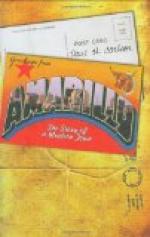Harry was now arrayed for church. He was a figure to please any woman’s eye, thought his mother, as she walked beside him, and gloried silently in his six feet of health and muscle and dainty cleanliness. He was in a most amiable mood, what with the Saint Bernards and the season. As they approached the cathedral close, Harry, not for the first time, admired the pure Gothic lines of the cathedral, and the soft blending of grays in the stone with the warmer hues of the brown network of Virginia creeper that still fluttered, a remnant of the crimson adornings of autumn. Beyond were the bare, square outlines of the old college, with a wooden cupola perched on the roof, like a little hat on a fat man, the dull-red tints of the professors’ houses, and the withered lawns and bare trees. The turrets and balconies and arched windows of the boys’ school displayed a red background for a troop of gray uniforms and blazing buttons; the boys were forming to march to church. Opposite the boys’ school stood the modest square brick house that had served the first bishop of the diocese during laborious years. Now it was the dean’s residence. Facing it, just as you approached the cathedral, the street curved into a half-circle on either side, and in the centre the granite soldier on his shaft looked over the city that would honor him. Harry saw the tall figure of the dean come out of his gate, the long black skirts of his cassock fluttering under the wind of his big steps. Beside him skipped and ran, to keep step with him, a little man in ill-fitting black, of whose appearance, thus viewed from the rear, one could only observe stooping shoulders and iron-gray hair that curled at the ends.
“He must be the poor missionary who built his church himself,” Mrs. Lossing observed; “he is not much of a preacher, the dean said, but he is a great worker and a good pastor.”
“So much the better for his people, and the worse for us!” says Harry, cheerfully.
“Why?”
“Naturally. We shall get the poor sermon and they will get the good pastoring!”
Then Harry caught sight of a woman’s frock and a profile that he knew, and thought no more of the preacher, whoever he might be.
But he was in the chancel in plain view, after the procession of choir-boys had taken their seats. He was an elderly man with thin cheeks and a large nose. He had one of those great, orotund voices that occasionally roll out of little men, and he read the service with a misjudged effort to fill the building. The building happened to have peculiarly fine acoustic properties; but the unfortunate man roared like him of Bashan. There was nothing of the customary ecclesiastical dignity and monotony about his articulation; indeed, it grew plain and plainer to Harry that he must have “come over” from some franker and more emotional denomination. It seemed quite out of keeping with his homely manner and crumpled surplice that this particular reader should intone. Intone, nevertheless, he did; and as badly as mortal man well could! It was not so much that his voice or his ear went wrong; he would have had a musical voice of the heavy sort, had he not bellowed; neither did his ear betray him; the trouble seemed to be that he could not decide when to begin; now he began too early, and again, with a startled air, he began too late, as if he had forgotten.




